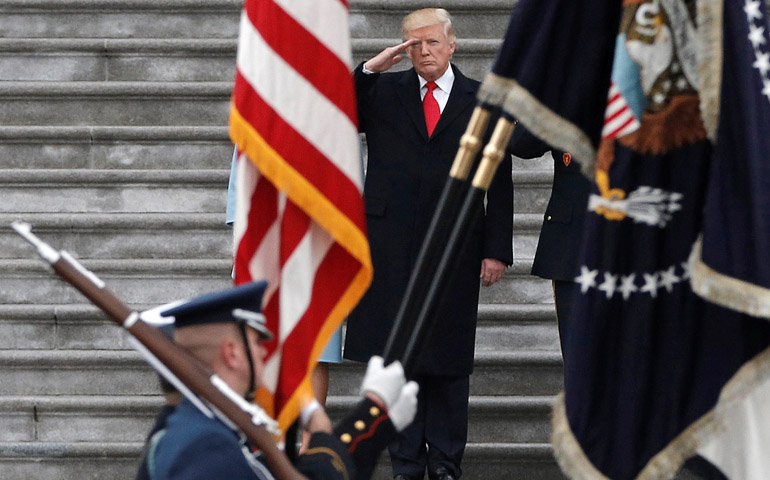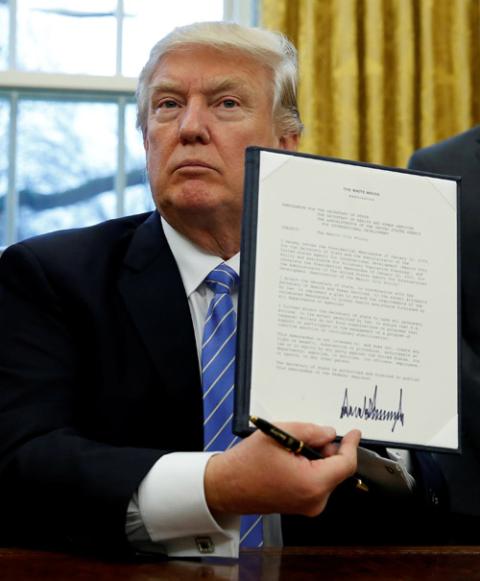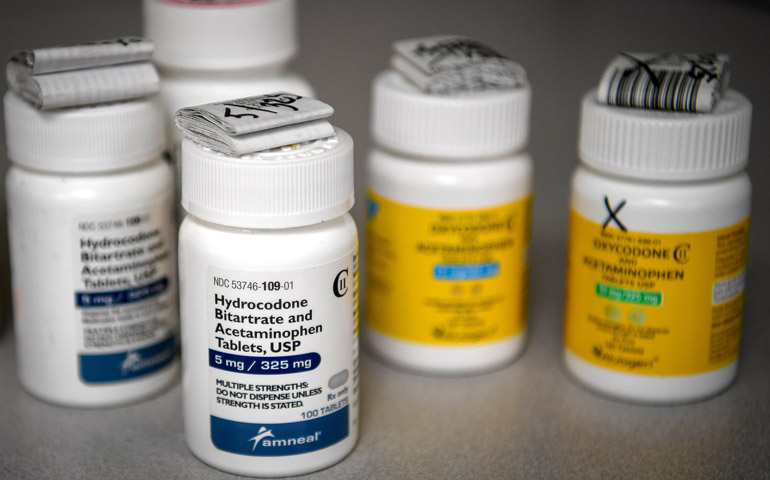
President Donald Trump salutes the ensign and military personnel in Washington Jan. 20. (CNS/Mike Segar, Reuters)
The election of Donald Trump has been an unmitigated disaster for the United States and the world, but is there anything positive that might come from the Trump administration? Trump supporters, of course, think he will have a positive effect on our country and the world, but are there any issues on which the Trump administration might get bipartisan support?
The U.S. bishops, who oppose him on many issues, believe that he will be good for the pro-life cause. Already he has appointed a pro-life justice to the U.S. Supreme Court, brought back the "Mexico City policy" of forbidding U.S. aid to foreign nongovernmental organizations that provide abortions, and worked to defund Planned Parenthood. The bishops also hope he will support them on issues of religious freedom, such as the contraceptive mandate. It is unlikely that any of these issues will find a bipartisan support.
Are there areas where the country can find bipartisan agreement?

President Donald Trump holds up his executive memorandum reinstating the "Mexico City Policy" banning federal funding of abortion-providing groups abroad after he signed it Jan. 23 in the Oval Office of the White House in Washington. (CNS/Kevin Lamarque, Reuters)
One unforeseen impact of Trump is to unite Republican and Democratic members of Congress against him in passing bipartisan legislation imposing sanctions on Russia for its involvement in the 2016 election. The legislation does not allow Trump to withdraw the sanctions without congressional approval.
It is also likely that Congress will approve bipartisan legislation making it difficult for Trump to fire Robert Mueller, the special prosecutor investigating the Trump campaign's involvement with the Russian intervention in the 2016 presidential election. Who knows what other ways Trump may inadvertently unite members of Congress?
But are there issues facing America where Trump may have a positive impact?
Trump's opposition to trade agreements is not that different from the views of Bernie Sanders and other liberals, who feel that American workers have suffered under globalization. While Trump has exaggerated the impact of trade on American jobs, there is no question that trade agreements need input from other voices than just multinational corporations looking to increase their profits. American workers, environmentalists, and those concerned about the rights of foreign workers should have prominent places at the negotiating table. Is this an area where Democrats and the Trump administration can work together?
Trump has also been very skeptical about U.S. involvement in the Middle East. Although he is all for destroying the so-called Islamic State or ISIS, he sees little positive coming out of our involvement in Afghanistan, Iraq or Syria. Progressives would agree. Can progressives and Trump find common ground in getting out of the Middle East?
Much has been made of the friendly relationship between Trump and Russian President Vladimir Putin. It is currently getting a lot of negative coverage in the media. If they want to prove that this relationship is not sinister, they will have to show some positive results from their friendship. The most immediate need is for them to find a way to stop or at least reduce the fighting in Syria. Putin wants to protect its ally, the Assad regime. Trump wants to defeat ISIS while at the same time untangling the U.S. from Middle Eastern conflicts.

A girl walks past the rubble of war in Damascus, Syria, July 19. (CNS/Bassam Khabieh, Reuters)
Trump has already announced that the U.S. will no longer fund anti-Assad rebels, which will please the Russians. Obama was never enthusiastic about arming these groups. There has already been an attempt by the U.S. and Russia to negotiate a ceasefire in southwest Syria. Peace would probably leave Syria partitioned and unstable, but better off than it is now. An end to the fighting in Syria would boost the international standing of both Putin and Trump. Could Democrats support it?
Making peace in Syria would require getting other actors to the negotiating table, but there is a bilateral action that could give Trump and Putin an easy victory and international applause — reducing Russian and American nuclear stockpiles.
The last agreement (New START) in 2010 limited each side to 1,550 strategic nuclear warheads deployed on 700 strategic delivery systems (intercontinental ballistic missiles, submarine-launched ballistic missiles and heavy bombers), and limited deployed and nondeployed launchers to 800. There are also thousands of nondeployed warheads in the stockpile of each country.
These weapons are expensive to maintain and could easily be reduced by half without impacting the security of either country. An agreement on reducing nuclear weapons would be positively greeted around the world. Could Trump and Democrats work together on this?
Reaching an agreement on Syria and nuclear weapons will not be easy with the atmosphere souring between Russia and the United States, but it is not impossible. The United States has the bad habit of categorizing countries as either friends or enemies, which makes diplomacy difficult. We need to learn to work towards agreements where possible with a government while still having serious disagreements, whether that be with Russia, Iran, Saudi Arabia, Turkey, Cuba or even North Korea.
Are there any domestic policies that might find bipartisan agreement?
Many commentators point to rebuilding U.S. infrastructure as an obvious program with bipartisan support. Here the biggest problem will be how to pay for it. Increasing gasoline taxes or deficit spending will be opposed by many Republicans, but some compromise might find bipartisan support.
The most likely issue for which bipartisan agreement is possible is the opioid crisis, which kills nearly 100 Americans each day. With the drug crisis now impacting the white middle class and rural America, politicians appear ready to see it as a health crisis rather than simply a crime. Trump said intelligent things about this crisis during his campaign. Democrats and Republicans should be able to make a deal here.

Bottles of opioid-based medication are seen at a pharmacy in Portsmouth, Ohio, June 21. (CNS/Bryan Woolston, Reuters)
The president's stingy budget, which cuts most domestic programs, called for a 2 percent increase in drug treatment programs. These programs are aimed at getting people off drugs, yet there are long waiting periods for people who want to get in them. The U.S. has unsuccessfully spent billions of dollars trying to cut down the supply of drugs by treating everyone involved with drugs as criminals. Reducing the demand through treatment needs an equally robust investment. Every indication points to the possibility of bipartisan support for a sensible program to deal with drug addiction.
Progressives rightly bemoan most actions of the Trump administration, but they should not be blind to opportunities for progress on Syria, nuclear disarmament and the opioid crisis. There may even be other areas where cooperation is possible. Supporting bipartisan action to solve serious problems is the right thing to do, even if it means working with the Trump administration. In fact, on some issues, the Trump administration may be able to accomplish things a Democratic administration could not because Republicans would support him whereas they would oppose the same programs coming from a Democrat.
[Jesuit Fr. Thomas Reese is a columnist for NCR and author of Inside the Vatican: The Politics and Organization of the Catholic Church.]
Editor's note: Sign up to receive free newsletters , and we will notify you when new Faith and Justice columns are out.
Advertisement








